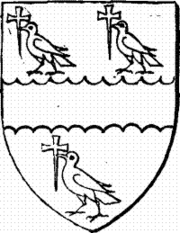John Port (judge) facts for kids
Quick facts for kids
Sir John Port
|
|
|---|---|

The Port coat of arms
|
|
| Born | c.1472 |
| Died | March 1540 Bewdley
|
| Education | Middle Temple |
| Occupation | Judge |
| Spouse(s) |
|
| Children | Sir John Port Ellen Port Barbara Port Maria Port |
| Parent(s) | Henry Port, Anne Barrow |
Sir John Port (born around 1472, died about March 14, 1540) was an important judge in England. He lived during the time of King Henry VIII. Sir John Port was involved in some very famous court cases, including those of Sir Thomas More and Anne Boleyn.
Contents
Sir John Port's Family Background
John Port was born in Chester around 1472. His family had been successful merchants in Chester for many years. His father, Henry Port, was a sheriff of Chester and later became the mayor of Chester. His mother, Anne Barrow, was the daughter of Robert Barrow, who also served as a sheriff and mayor of Chester.
Sir John Port's Career as a Judge
By 1495, John Port had moved to Etwall in Derbyshire. This move happened after he married the daughter of John Fitzherbert.
Studying Law and Early Roles
Port studied law at the Middle Temple, which is one of the famous law schools in London. He became a "Reader" there in 1509, which meant he taught law. He also served as treasurer and governor at the Middle Temple.
In 1504, he helped collect taxes in Derbyshire. A few years later, in 1509, he became the King's solicitor. This was an important legal role, helping the King with legal matters. He also became a member of the Privy Council, a group of advisors to the King.
Becoming a Judge
John Port continued to take on more important roles. He was involved in checking on problems with the royal mint, where coins were made. From 1515 onwards, he regularly served on the peace commission in Derbyshire. This meant he helped keep law and order in the area.
In 1522, he became a "serjeant-at-law," which was a high rank for a lawyer. He was very busy as a lawyer, handling many cases. In 1525, he was made a Justice of the King's Bench and was also knighted by the King. This made him "Sir John Port."
Important Court Cases
As a judge, Sir John Port traveled to different parts of England to hear cases. He was part of the group that tried John Fisher and Thomas More in 1535. The next year, he was also involved in the trial of Anne Boleyn, who was King Henry VIII's second wife.
Sir John Port passed away around March 14, 1540.
Sir John Port's Legacy
Sir John Port's son, John Port the Younger, also became very important. He helped set up Brasenose College, Oxford, by donating land. He also made sure money was available to pay teachers at the college.
John the Younger also founded Repton School. The land where the Port family's old home once stood in Etwall is now a secondary school. This school still uses the Port family crest, which has three birds, as part of its own school badge.
Sir John Port's Marriages and Children
Sir John Port was married twice.
First Marriage
His first wife was Joan FitzHerbert. She was the daughter of John FitzHerbert, who worked for the King's treasury. With Joan, Sir John Port had one son and three daughters:
- John Port, who later became Sir John Port the Younger.
- Ellen Port, who married Sir Edmund Pierrepont and then Sir John Babington.
- Barbara Port, who married Sir John Francys.
- Maria Port, who married Sir George Finderne.
Second Marriage
In the 1520s, Sir John Port married Margery Trafford. She was the daughter of Sir Edmund Trafford. Sir John and Margery did not have any children together.
 | Tommie Smith |
 | Simone Manuel |
 | Shani Davis |
 | Simone Biles |
 | Alice Coachman |

